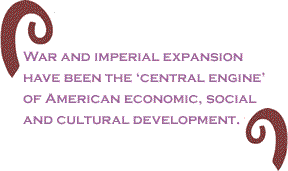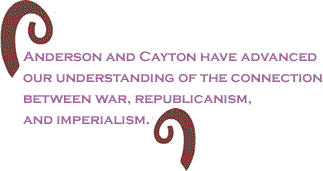
|
|||||||||||||||||||||
|
This article was originally published in the Hartford Advocate. "Increasingly, Americans are a people without history with only memory, which means a people poorly prepared for what is inevitable about life – tragedy, sadness, moral ambiguity – and therefore a people reluctant to engage difficult ethical issues." – Elliot Gorn, "Professing History: Distinguishing Between Memory and Past," Chronicle of Higher Education (April 28, 2000). Between August 2002 and October 2002 President Bush successfully drummed up a war fever in America designed to topple Iraqi Dictator Saddam Hussein, alleged to be the possessor of weapons of mass destruction that he planned to use on America. Bush did so without providing the evidence, the costs, the "why now" explanation, or long-term implications of such a war, yet still received the United States Congress' virtual declaration of war for a historically unprecedented pre-emptive strike. And even now, the Congress and just about all of the nation's media outlets have still refused to demand answers to the hard questions about what has been taking place in Iraq. Only a society accustomed to war – and predisposed to the use of war and violence – would accept war so quickly. When all of President Bush's explanations for the American invasion of Iraq crashed, he quickly shifted to the time-tested American "just-war" rationale for war – America had to liberate an oppressed people and help them create liberty and democracy. This has been an American claim – and cultural ideal – since the War of 1812.
The development and use by Americans of the "just-war ideology," intriguingly, is one of the major themes in a significant new reinterpretation of the 400-year American historical experience. In Dominion of War: Empire and Liberty in North America , 1500-2000 (Viking Press, 2005), by two prize-winning historians, Fred Anderson and Andrew Cayton, the authors say: "We construct a history of North America that emphasizes wars and their effects and stresses the 'centrality' of imperial ambition to the development of the United States." Americans should "see the imperialist adventures of 1812 [war with England], 1846 [war with Mexico], and 1898 [war with Spain], and the wars of liberation that began in 1775 [the Revolution], 1861 [the Civil War], and 1941 [World War II] as related." They continue: "our purpose" is to emphasize "the importance of the wars Americans have fought less to preserve liberty than to extend the power of the United States in the name of liberty." Pointing up the book's contemporary relevance, they write, "To this day the tendency persists ... to justify war as an altruistic determination to rid the world of tyrannies that would crush the human spirit." War and imperial expansion, they argue in this engrossing and highly readable 420-page volume, have been the "central engine" of American economic, social and cultural development, but Americans still tenaciously retain the self-image of being a peace-loving people, who only respond to attacks upon them: indeed, "Americans ... constructed their conquest of North America as a collective sacrifice in the service of human liberty."
As a peace-loving people, "it is an article of faith that their wars have been forced upon them by those who would destroy their freedom," and thus, "Americans tend to believe that by winning wars, they made the world a better, safer, freer place." This book is the first work by professional historians in more than a generation to organize America's historical experience around war, republicanism and imperialism. During the 1960s and early 1970s, a small group of historians led by William Appleman Williams and Walter LaFeber (who Anderson and Cayton praise) raised precisely this issue in their books, largely in response to claims by presidents Kennedy, Johnson, Nixon and Ford that the Vietnam War was to free the Vietnamese people from oppression and give them freedom and democracy. But these '60s works were rejected by most college- and university-affiliated professional historians, who were concerned, while American soldiers were dying, about being tainted as "unpatriotic" during a major war. Sadly, this avoidance of America's darker side – or more accurately, America's historical similarity to all other major nations – still continues and this book exhibits some of those tendencies. Organizing the book around the lives and careers of eight men, five of whom were great American military figures, Samuel de Champlain, William Penn, George Washington, Andrew Jackson, Antonio Lopez de Santa Anna, Ulysses Grant, Douglas MacArthur, and Colin Powell, Anderson and Cayton show how war played a major role in shaping North America from the 1500s through the present. The only weakness in their otherwise superb description of the connection between American republicanism, war, and imperialism is the authors' studious avoidance of the causative factors in American society and culture over these hundreds of years. Without a serious examination of the underlying causes or origins within American culture and society, the book seems to be promoting a sophisticated version of "one-thing-led-to another" and the United States suddenly had the most powerful military and a worldwide empire. What Anderson and Cayton have done is reminiscent of 20th century historians' unwillingness to examine and explain the persistence of astonishingly high levels of interpersonal violence and crime throughout the American historical experience. As a result of that oversight, there is little understanding of the connection between the predisposition to domestic violence and the predisposition to war and the role of war and violence in the shaping of American culture and society – what the leading historian of violence in America, Richard Maxwell Brown, called America's "strain of violence." Anderson and Cayton have advanced our understanding of the connection between war, republicanism, and imperialism, but have not explained the why. Well over 10 million Americans were victims of violent crimes during the last 100 years alone – 1,089,600 were homicide victims and the rest were raped, robbed or physically assaulted. Anderson and Cayton depict Americans as almost instinctively aggressive but do not explain if this American culture of violence is simply a convenient tool used at various times by America's leaders for political purposes against "enemies" of American freedom, or whether the leaders are in the grip of this cultural trait.
It is “a profoundly ironic accident of the revolutionary origins of the United States," they state, "that the power-abhorring ideology of resistance, republicanism, formed the basis of political culture in what soon proved one of the most dynamically expansionist territorial empires in history” ( p. 423). Fleetingly, in their introductory chapter, the authors simultaneously criticize American historians for avoiding or deflecting the central issues dealt with in their book – and of course the American experience – and the American people who refuse to allow themselves to consider what their nation has been doing for hundreds of years. “American historians,” they state on page xi, “have generally approached the imperial dimension of the nation’s history obliquely, treating occurrences of jingoism, like the war fevers of 1812 [war with England], 1846 [war with Mexico], and 1898 [war with Spain] as unfortunate exceptions to the antimilitarist rule of republicanism.” Then, on page xiii, they say, a “set of popular notions about the shape of American history, which taken together comprise a grand narrative so deeply embedded in American culture that they persist despite the long-running efforts of professional historians to correct or revise them.” How can an “oblique treatment” of American wars suddenly be transformed a few pages later into “long-running efforts of professional historians to correct and revise” popular notions is beyond me. Anderson and Clayton reject the claim of "American Exceptionalism,” which Americans have been taught, yet they seem unable to suggest that America is little different in its actions over time than most other nations, say those of “Old Europe.” Meanwhile, President Bush, convinced of the success of his Iraqi adventure, in his second inaugural address, called upon America to rebuild the world. "The policy of the United States," he said, is "to seek [out] and support the growth of democratic movements and institutions in every nation and culture, with the ultimate goal of ending tyranny in our world." But he did not say whether his plans to accomplish this new national mission will require more military invasions of foreign governments. Stay tuned. Part I of this article appeared in the June 30 issue of The Black Commentator. Ira M. Leonard, New York University Ph.D 1965, has been a professor of history at Southern Connecticut State University for over 35 years. He can be reached at [email protected]. |
Your comments are always welcome. Visit the Contact Us page to send e-Mail or Feedback or Click here to send e-Mail to [email protected] e-Mail re-print notice
If you send us an e-Mail message we may publish all or part of it, unless you tell us it is not for publication. You may also request that we withhold your name. Thank you very much for your readership. |
| July 7 2005 Issue 145 |
|||||||||
|
|||||||||
|
|
|||||||||
| Printer Friendly Version | |||||||||
 |
|||||||||
 |
|||||||||
| |
|||||||||
| |
|||||||||




























